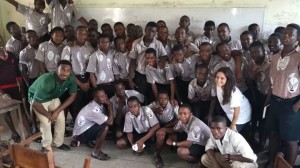
Entrepreneurship: Reconnecting to Traditional Roots and Social Impact
by Julian Addy
The quest for developing a deeper sense of self is always enriched by our ability to feel that whatever we are doing is creating an impact. Whether it is through working at a company, improving ourselves through education, or working with a non-profit, humanity has an inherent desire to feel that they are making a difference. After participating in the Harvard Summer Venture Management program and interacting with my peers who each had diverse skill sets and a myriad of accomplishments, I was reminded that my own capabilities were limitless. In addition to making it a goal to apply to the Harvard Business School, as I’m sure we all did, I wanted to find a way to make a difference before graduating. Instead of allowing the weight of big decisions get the best of me during my senior year, I decided to participate in a program that allowed me to give back to the country of my birth through entrepreneurship.
I was born in Accra, Ghana and moved to the U.S. when I was 5 years old. Like most immigrants who move to the United States in pursuit of the American dream, my parents were extremely adamant about the role of education as a source of relieving financial burdens. Unfortunately after moving to the U.S, I never returned to Ghana. After 16 years of developing my skills in the U.S. I made the decision to go back to Ghana through a two-week teaching program sponsored by Babson College.
While in Ghana I was partnered with another Babson senior and was given the opportunity to teach a one week entrepreneurship class in two high schools. At the end of the week, students would compete in a business plan competition in hopes of winning a laptop and prizes for their school. Essentially what this looked like was teaching base level marketing concepts, operations strategies, start-up costs, and employee relations. Despite the fact that some of my students had never formally written a business plan, I was highly impressed by how well thought out the business ideas proposed by the students were. Can you imagine teaching a class to over 50 students, who at times made it seem like they were not paying attention, and then asking them to present a business plan and they propose ideas that have the potential to drastically change the power and litter situation in Ghana?
To say that this trip was a transformative experience is an understatement. Even though I was a teacher, my students taught me the value of unrestrained creativity and capitalizing on all potential resources. This was not just a trip to Ghana for me. This was a chance to reconnect with my culture by validating a deeper sense of self.

